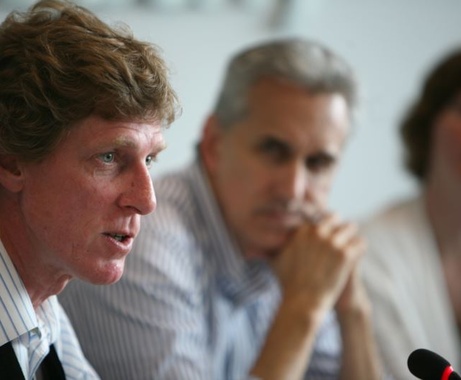By Aynur Jafarova
The newly established Eurasian Economic Union (EEU) will give the three member states - Belarus, Kazakhstan and Russia - several advantages, an expert on Central Asia and Senior Correspondent at Radio Free Europe/Radio Liberty said.
Bruce Pannier noted, the advantages include trading within the bloc, discounted prices on items produced in one country and sold in another.
"Joining the union makes sense for Belarus because it could use Russian and Kazakh oil and gas. For Kazakhstan it is not so clear and one gets the impression that Kazakhstan is in the EEU because it has a long border with Russia and needs to ship a large percentage of its oil via Russian pipelines. Russia could make Kazakhstan's trade life very difficult if Astana resists closer ties with Russia," he said.
Kazakhstan, Belarus, and Russia signed an agreement on the establishment of the Eurasian Economic Union (EEU) on May 29. Several experts say the establishment of the EEU means the prosperity of the Soviet Union.
"Several political analysts have already said that for Russia the EEU is especially important now as a symbol, that Western sanctions on Russia for Ukraine's situation are not isolating Moscow. Put it another way, it shows that Russia still has friends and in fact remains a leader in a large part of the former Soviet space," he noted.
However, there are some drawbacks for Kazakhstan, Pannier added.
"Located at the heart of the Eurasian continent, Kazakhstan has always imagined that it would be a trade hub between East and West, and even South and North," he said. "The EEU has regulations on importing goods from non-EEU countries and exporting those goods within EEU countries. That means whatever Kazakhstan imports from, say, China, would face high duties and tariffs. This applies to anything which it buys from China to sell to Belarus, especially if Russia, or some future EEU members (Kyrgyzstan, Armenia, Tajikistan) are producing the same goods."
Thus, the EEU rules stops Kazakhstan from being an international trade hub, Pannier added.
The expert doesn't see any possible similarity between the EEU and the EU.
"The level and history of industrial developments of the two unions are very different," he said.
Touching on future members of the organization, Pannier said Armenia is already preparing for entry and Kyrgyzstan will not be too far behind. Tajikistan is likely to join soon as well.
"In any CIS country where Russia is a major trading partner, there will be a reason for joining the EEU. The EEU has its particular set of trade rules and regulations that, as is usually the case, provide the member states with advantages to impose higher fees/prices on trade with non-member states," he said.
"Kyrgyzstan is a good example. A significant amount of Kyrgyzstan's regional trade is based on re-export of goods from China to neighboring Central Asian countries. The border with Uzbekistan is effectively closed and the border with Tajikistan has been problematic and for example, has been closed much of this year. So Kyrgyzstan's Chelniki started several years ago to direct most of their cross-border trade toward their relatively rich northern neighbor Kazakhstan," he said.
The expert believes Kyrgyzstan's trade partners are anxious for the country's joining the Russia-backed Customs Union.
"Kazakhstan is a member of the Customs Union and there are rules against imports of third party goods (China-Kyrgyzstan-Kazakhstan) from non-members. So many Kyrgyz merchants are now waiting that Kyrgyzstan joins the union so they can start trading with Kazakhstan again and, as Kyrgyz Prime Minister Joomart Otorbayev said, have access to a market with 170 million potential customers," he noted.
Kazakh President Nursultan Nazarbayev said the presidents of the three countries received an appeal from the Azerbaijani side which urged Armenia to accept a stipulation that the provisions of the WTO and the CU should be enforced within its borders recognized by the international laws.
Pannier believes Armenia will get in simply "because Russia wants Armenia in and Yerevan has been an enthusiastic applicant for entry into the EEU."
"The Kremlin wants other CIS countries and the outside world to take note of Armenia's eager desire to join the EEU, as an example that others should follow. Kazakhstan will object publicly to Armenia's entry to keep good ties with Azerbaijan. There is a good reason for that since Kazakhstan is shipping oil via Azerbaijan," he said.
Touching on the possible steps which could be taken by the member states to strengthen the organization's position in the international relations system, the expert noted, events in Ukraine are driving Russia to get this union approved and commissioned as soon as possible.
"It allows Russia to show the world it has allies, it also allows the Russian government to drive its business sector towards an internal market (inter-EEU) that can to some extent replace the Western market that Russia is currently losing over its actions in Ukraine," he concluded.
Fellow and Deputy Director of Russia & Eurasia Program at the Center for Strategic and International Studies (CSIS) Jeffrey Mankoff believes that, at its core, the EEU is a political project.
"Astana has always argued that it would only accept economic integration, but the experiences of the past four years indicate that the economic benefits of integration are not so great, and that at its core the Eurasian Economic Union is a political project. Especially since the onset of the Ukraine crisis, Kazakhstan feels it has fewer options and has to go along at least with the form of a deeper integration. It signed the treaty the other day but only after a concerted campaign to water it down. The calculus seems similar in Kyrgyzstan, Tajikistan, and Armenia. For that reason, the Eurasian Economic Union is not like the EU, which is a consensual project developed over the course of several decades rather than being imposed by one dominant power as a means of preserving its political influence," he told AzerNews.






